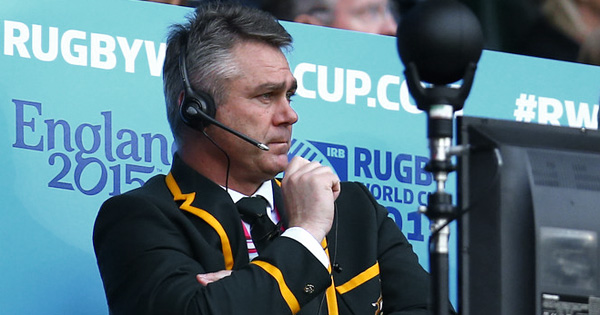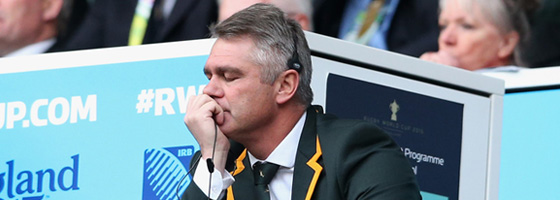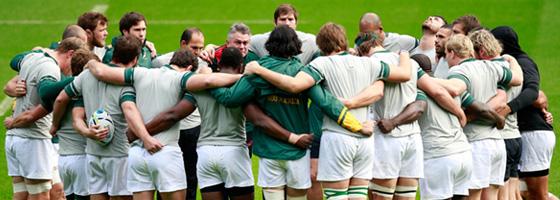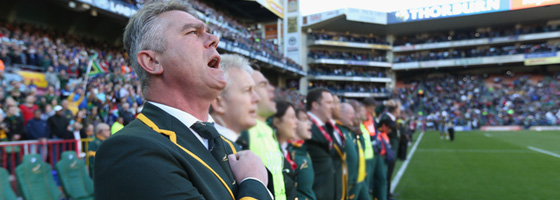
Heyneke Meyer has effectively stepped down as coach of the Springboks, advising the South African Rugby Union (SARU) that he longer wishes to be considered as a Head Coach candidate going forward. Meyer led the Springboks to a third place showing at RWC 2015.
Meyer recently met with SARU President, Oregan Hoskins, and CEO, Jurie Roux. The decisions follows those meetings, with Meyer stating that he has chosen to stand aside for the best interests of South African rugby, following recent developments.
In 2015 South Africa lost to Argentina and Japan, both for the first time ever.
The Japan loss at the World Cup was particularly damaging, although led by Meyer and senior players, the squad turned things around and went on to win every match and get within two points of the eventual champions, the All Blacks, in the semi final.
The Springboks then beat Argentina, to end in a respectable third place overall.
When Meyer took over after the 2011 World Cup the team were at fourth place in the official world rankings, before he lifted them to second in the world by the end of his first season in charge. They maintained that positions in 2013 and 2014, with a combined winning ratio of 77%.
During that period there was a record breaking win over Australia in Brisbane (38-12), a big Rugby Championship win over Argentina in Soweto (73-13) and the first away win over France in 16 years. The Springboks also achieved two unbeaten end of year tours to the UK.
Meyer’s overall record stands at 34 victories from 50 matches, scoring 143 Test tries during that time, second only to New Zealand during that period.
A new approach was exciting Bok fans, with an expansive style of attacking rugby, but in 2015 that all seemed to change, and the gameplan seemed very focused on the traditional strengths, as the Springboks seemingly went into their shells.
This, along with a few selections that fans didn’t agree with, is one of the huge reasons for Meyer’s detractors calling for his head on numerous occasions.

“I have always put the Springboks first in my time as coach and since returning from England I have realised that as much as I believe I still have a lot to offer, the time has come for change,” said Meyer.
“My integrity has always been very important and I feel I can leave with my head held high. I’ve always maintained that my only motivation was to serve my country and to do what was best for the Springboks.
“I have greatly enjoyed my time as Springbok coach – although it has been highly pressured at times and especially tough on my family, and I would like to thank them for their unwavering support in the last four years.
“I have put my heart and soul into the job and did my very best. I believe that, overall, I leave the team with much to look forward to in 2016, with new structures in place to ensure the Springboks will remain competitive on the world stage.
“The number of young players that have been blooded over the past four seasons, who chose to remain in South Africa, leave the team in a great position to move on in the next few years. I would like to wish the next coach all the success in this wonderful position.
“The Springboks are a special team and carrying the hopes of a nation is a huge responsibility and great privilege. I realised that yet again with all the support I received from ordinary South Africans, both at the World Cup and upon our return to the country.

“Thank you to the countless faithful, positive and passionate supporters that have made my job as coach a joy.
“To everyone at SARU and for the hard work and commitment of my management and support team, I will be forever thankful. And finally to the players – you are ultimately the reason why I coach and you’ve enriched my life in the last four years.”
Mr Hoskins thanked Meyer for his services to South African rugby.
“We have reached a natural watershed in many ways with a significant number of senior players either retiring or moving overseas as well as the fact that our Strategic Transformation Plan is now in full swing,” said Mr Hoskins.
“Heyneke gave his all for the Springboks and it was a great pleasure to work with such a passionate South African. There were many highlights during his time as coach and those are the moments we will remember.
“He also set very high standards of behaviour for himself, his management team and his players and he was and is a credit to South African rugby. I’m sure all my colleagues join me in wishing him the very best of luck in whatever coaching path his career now takes him.”
SARU said that the search for a successor would begin immediately. The CEO will present the process of recruitment as per the recommendation of the High Performance Committee for approval to the Executive Council on Wednesday, after which it will be shared with the provincial unions at the General Council meeting two days later.

Sign In